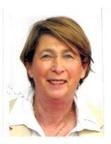Dorothea Shefer-Vanson's Blog, page 18
February 10, 2022
A Beethoven Feast
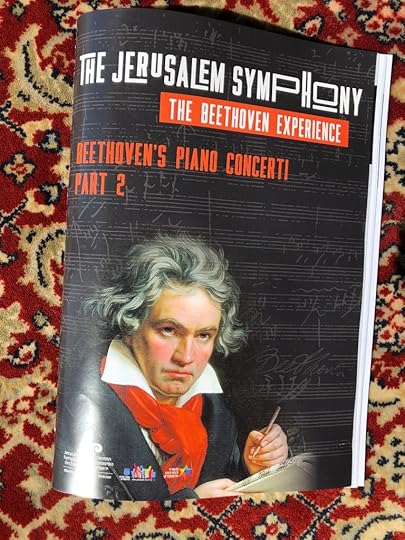
Being able to hear all five Beethoven piano concerti played on two successive evenings was a rare treat. This was provided by the Jerusalem Symphony Orchestra, conducted by maestro Steven Sloane, and brought Beethoven’s immense oeuvre in this realm into sharp and impressive perspective.
On the first evening we heard concerti nos. 1, 3 and 4. Each one was played by a different young Israeli soloist, all of whom were amazingly talented and assured, playing with aplomb and grace. On the second, shorter, evening we heard nos. 2 and 5, thus ending with the magnificent last concerto, known as the Emperor. My unprofessional but accustomed ear did not pick up a single false note or tone in any of the performances and, as ever, I went away full of admiration for the amazing and talented young pianists Israel seems able to produce, including one young man who is Palestinian. Those two events were truly inspiring, providing nourishment for the soul and the mind.
Another admirable feature was the fact that two of the soloists were women, and their performances were in no way overshadowed by those of their male colleagues. To play a Beethoven piano concerto requires stamina and fortitude as well as talent, technical ability and application, and all five of the soloists displayed all the requisite characteristics in abundance. To hear Beethoven’s enormous range of power, expressive ability, sensitivity and musicality played with prodigious verve, precision and bravura is an experience not to be forgotten.
Was there a fly in the ointment? Yes, of course there was. This was represented by certain members of the audience. In these Corona times the audience is usually spread out in such a way as to leave an empty seat between people from different households. Although it isn’t always possible to keep to this rule, my husband and I certainly try to do so. Even so, there are always people sitting in the rows in front of us (we usually sit in the last row) and further along in the same row, and it is virtually impossible to avoid seeing what they are doing. Thus, people who insist on bobbing their head around or moving hand or arms to demonstrate their familiarity with the music (and after all, who isn’t acquainted with it?), constitute a constant nuisance and irritation to people like us, who are accustomed to the custom of sitting still in a concert. After all, the conductor does enough head-bobbing and hand-waving to keep the music going without assistance from the audience. Maybe someone should point out to them that the kind of behaviour that is customary in a rock or pop concert is not appropriate for one of classical music.
The latest addition to the litany of disturbances impairing our enjoyment of concerts is the ubiquitous mobile phone. I’m not talking about the people who forget to turn their phone off, so that its sudden ring constitutes a brutal intrusion into the music, disturbing the whole audience, and probably the musicians as well. What I’m referring to are people sitting near us who cannot bear to be parted from the screen of their phone for a single second. Why must one check one’s phone for messages while in a concert? To my mind, the beauty of a live concert lies in the opportunity it provides to focus solely and entirely on the experience of the moment, the live performance of great music, instead of listening to recorded music or even a live performance at home, where there are a million and one distractions.
All the same, the various trivial annoyances are never going to prevent me from benefiting from the pleasure I derive from attending a concert.
February 3, 2022
Consumers Revolt

In the same week as the government announced a rise in the price of fuel and electricity several major food importers and manufacturers in Israel proclaimed that they would also be raising prices.
For once, instead of the usual passive acceptance of their fate, consumers in Israel took action. Led and encouraged by commentators in the various media (TV, radio, newspapers, social networks), the indignation of the average consumer at being subjected to yet another price hike was expressed in a general boycott of their products.
Thus Osem, one of the major producers of such basic items as pastas, snacks, processed foods and sundry other foodstuffs, suddenly experienced a 25 percent drop in purchases of their products. Osem was once a publicly-traded Israeli company but was taken over by Swiss-owned Nestlé a few years ago, and became a private entity. No longer was its balance-sheet open for public review and its profits and financial management were hidden from view. To a great extent, under its new name as Nestlé-Osem, while the paychecks of its senior executives were no longer a known quantity, they were acknowledged to be extremely generous. Dividends were also paid out, but not to shareholders, as there were no longer any of them.
Other companies, whose names were less well-known but which also controlled a large part of the market for toiletries and other items, also announced price-rises of their goods. Many of them are monopolies in their field, leaving the consumer little choice in the matter of selective purchasing.
The commentators were at pains to publicise the names of the various producers while detailing the products they controlled. It did not take long for people to sit up and take note of what was going on, though I did not hear of any action on the cards by the government to stop what was tantamount to their acting as a cartel. Functioning as a cartel is illegal, and I have been personally warned not to ask my professional association to publish translation rates as if it did so it would be liable to prosecution as a cartel!
Strangely enough, no one (as far as I know) has pointed a finger at the government and accused it of being responsible, at least in part, for the price rises everyone is so het up about. But everyone knows that electricity and fuel – as well as taxes and customs charges — are basic inputs that are involved in one way or another in the import, production and distribution of all goods. How has this gone unnoticed? We know that world prices of energy of various kinds have gone up, but the shekel is currently one of the strongest currencies in the world, obviating the need to raise prices. And in any case these would surely not have had to be immediately passed on to the population at large.
As a result of the outcry, some major manufacturers have said that they will defer raising their prices until after the upcoming Passover (Pesach) holiday, when there usually is a sharp rise in food purchases by the public. But that is little consolation, as we know that the blow will fall then. So many Israelis are struggling to make ends meet, whether they are young families or old-age pensioners, and it is a sorry state of affairs when what was once a society based on egalitarian values becomes one in which homeless people freeze to death in the street and many families cannot afford heat, light and food.
January 27, 2022
A New Ad-Venture
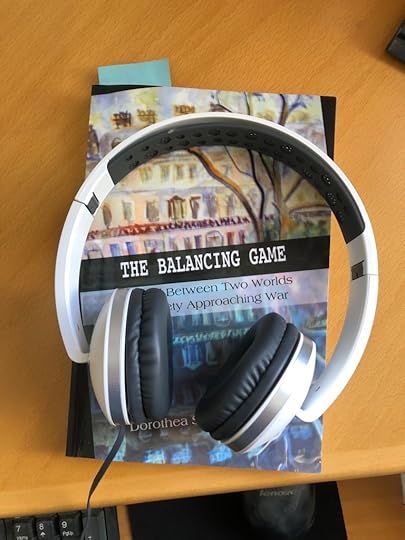
For some time now I have been hearing and reading about audiobooks. Members of my family have told me that they listen to them while on long car journeys or taking long walks. The idea seemed alien and remote to me. After all, I have been addicted to the printed word since childhood, and cannot bear to be without something to read at all times. It’s true, I do manage to read ebooks on my iPhone and iPad, but still prefer to hold a physical book in my hand.
But after writing eight books in the last ten years I felt that the wellspring of my inspiration was beginning to dry up, so I decided to attempt to create an audiobook of one of my books. As it happens, I was wrong about that wellspring drying up, as the muse did resurface and inspired me to embark on writing a new book, but that is something that will progress slowly and organically, leaving me time and energy for my new venture.
I decided to narrate the book myself, as it seemed appropriate for an author to narrate his/her book themselves, and also because I couldn’t afford to pay someone to do it.
The first hurdle to be overcome was that of equipment. One of my sons generously provided me with a good-quality microphone into which I could read the text of the book I had chosen. I decided to start with my first novel, ‘The Balancing Game; a Child Between Two Worlds, a Society Approaching War,’ containing fictionalized accounts of my childhood in postwar London and my experience of living in Jerusalem during the Six-Day War, when I was heavily pregnant.
The second step was to install a suitable program in the PC in my study and to equip myself with headphones. My son helped me in this too, and then it was time for me to take my first steps into unfamiliar territory. Needless to say, my initial attempts were not very successful. I was completely unused to speaking out loud and – even worse – hearing myself. I was fascinated by the markings that were produced on the screen, tracking the volume, spacing and nature of the phrases coming out of my mouth, and even though I eventually came to find these helpful, at first I had considerable difficulty understanding them.
After my initial attempts, I ventured to send a sample of what I had managed to produce to members of my family who were accustomed to listening to audiobooks. “There’s background noise and I can hear you turning the pages of the book as you read,” was one comment. “One can hear the clock ticking,” was another. What was I to do? Yet more hurdles to be overcome. The body of my computer, which produced a faint whirring noise, was moved off my desk by my obliging hubby and set down on the floor, as far away from the microphone as possible. The clock was taken off the wall. I was told to read from my iPad instead of the physical book (this involved enlarging the print of all the ebooks in it).
The last impediment was to find a time when I was not too tired and there were no extraneous noises from the street outside (cars starting, garbage trucks working, dogs barking). Fortuitously, I found myself suffering from jet-lag after visiting our other son in the USA. And so, instead of struggling to get back to sleep at 3 a.m., I decided to get up, have a quick cup of coffee, and sit down at my desk.
Thus, for the last few months, I have been keeping to that routine, getting up around 4 a.m. and reading out part of a chapter every morning. I have come to enjoy the daily encounter with the words I wrote several years ago describing the life I once lived. The beauty of the audiobook program is that it enables me to erase a segment if I stutter or stumble or misread a word or a phrase, as I often do. After reading out each paragraph I listen to it and either redo it or leave it. Consequently, it takes me about two hours each morning to record some twenty minutes of text, but I think I’m slowly getting better at it.
If nothing else, the experience has increased my admiration for the tech-savvy members of my family, as well as the people who read the news on the radio without coughing, stumbling or misreading, as I do.
The job of tying all the ends together and creating a passable audiobook still remains to be overcome. Hopefully, in a few months’ time I’ll be able to inform the world of the new audiobook on the market. Watch this space.
If you enjoyed reading this, please consider reading one of my 8 novels, all available on Amazon, and from my website: www.shefer-vanson.com
January 20, 2022
Where the Crawdads Sing
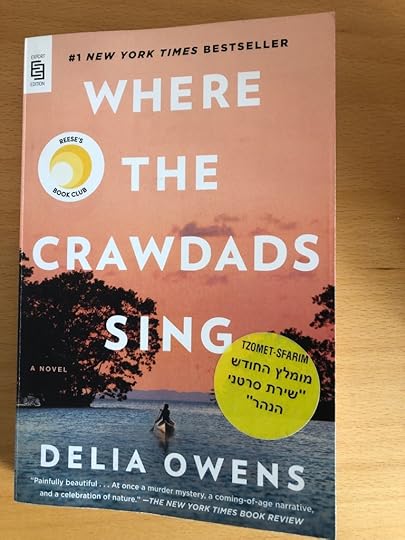
This novel by Delia Owens has been on the bestseller lists for a long time, so when it was offered at a reduced price in a local bookstore I bought it, intrigued by its strange title. I still don’t know what a crawdad is, and I don’t believe anyone does unless they are an accredited expert in animal biology and behaviour, as the author is.
The book opens with a description of a five-year-old girl, Kya, who is watching her mother leave their home, a tumbledown shack in a marsh area of North Carolina. What follows is a moving account of the way the family lives, with an abusive and violent father who causes all Kya’s siblings to leave home at one stage or another, eventually joined by their mother. The little girl struggles to survive, essentially on her own, though her father does put in an occasional appearance and even supplies cash with which she buys basic supplies in the nearby town. She is shunned as ‘marsh trash’ by the local inhabitants, and manages to avoid attending school except for one day which is a traumatic experience for her.
The surrounding marshland features prominently in the child’s life. She learns to find her way around in it, to eke out a living from it by strabbling for mussels and eventually by catching and smoking fish, which she barters for clothes from a local African-American storekeeper. The physical and natural world of the marsh area is described very graphically by the author, and almost constitutes a character in its own right. The birds and insects are described with intelligence and insight, evidently the result of extensive observation.
Over the years Kya collects objects connected with the birds and wildlife of the region, and establishes a relationship of sorts with a local boy, Tate, who is also interested in the marsh wildlife. She matures into a beautiful, if somewhat eccentric, young woman, but feels abandoned when Tate goes off to college in another town. Another young man, Chase, comes into her life, but their relationship is somewhat tenuous. Eventually, after various complications, Tate comes back to her, and they resume their relationship, each of them involved in studying the flora and fauna of the region in one way or another.
After many twists and turns, Kya is put on trial for the murder of Chase, whose body has been found at the base of the local fire tower. What happens next is unexpected, even shocking, and eventually the mystery is solved, albeit in a somewhat unsatisfactory manner.
Still, ‘Where the Crawdads Sing’ is a good read, combining interesting characters and plot with a fascinating account of a region which seems as remote to me as anything from outer space, and could equally constitute a science fiction saga.
January 12, 2022
The Corona Effect

When it all started, just about two years ago, everyone thought that the nasty bug known as Corona, or Covid 19, would soon come to an end. When it didn’t, precautionary measures were put into effect, with lockdowns, quarantine and the wearing of masks. People had to keep a certain distance from one another, and social mixing was either discouraged or actually forbidden.
Keeping apart from one another became a natural way of life. Physical proximity to anyone other than one’s immediate family was suddenly seen as a threat to life and limb. No one wanted to end up in hospital on a life-support machine, cut off from almost all human contact. Horror stories of children unable to bid farewell to a dying parent or, worse still, husbands and wives unable to do the same for one another, abounded.
Our lives, our whole way of living, changed. Doing the weekly supermarket shop became an almost insurmountable challenge. Deliveries by masked strangers who left packages of groceries outside the front door and departed without a word was virtually the norm. One refrained from opening one’s front door until the delivery person had left.
Sometimes going to a shop or store was inevitable, and the experience was well-nigh traumatic. The other people there were regarded as a threat. You inspected the other customers to see if they were masked, and if so, if the mask was properly over their mouth and nose. Going round a store was more like a law-enforcement operation than a normal daily activity. Everyone was regarded with suspicion. Everyone was a potential threat.
And so, either little by little or in one fell swoop, our social and cultural life came to an end. Travel abroad was more or less impossible. There were no more concerts, theatre performances or public lectures, and their replacement by Zoom or other screen-based interaction constituted a poor substitute for the things that had formerly made our lives more meaningful and interesting. Almost everything that had improved the quality of life disappeared. I feel particularly sorry for young people, who should be able to go out and enjoy life, but instead are being restricted to minimal contact with others.
And then, a year ago, the vaccinations appeared, and there was hope that our normal way of life could be resumed once more. The roll-out of vaccines went at different rates in different countries, but essentially the Western world seemed to be on the brink of a return to normality. That, however, was not to be. The swell of people opposing vaccination for a variety of genuine or spurious reasons has remained steady and is still a threat to those of us – the majority – who have been vaccinated. It’s a case of people who accept science and those who oppose it, and for the moment the minority that adheres to prejudice, superstition and/or delusion is able to restrict the freedom of everyone else.
It has become natural to avoid normal human contact. It has become customary to regard anyone who doesn’t wear a mask as an anti-social being. And so, from a fairly gregarious, average person I find myself turning into a misanthropic, distrustful churl, someone who shuns human contact, preferring to remain alone inside my home rather than venture out and mingle with other human beings.
The problem is, I don’t know if I can ever go back to being the person I once was.
January 6, 2022
Down the Time Tunnel
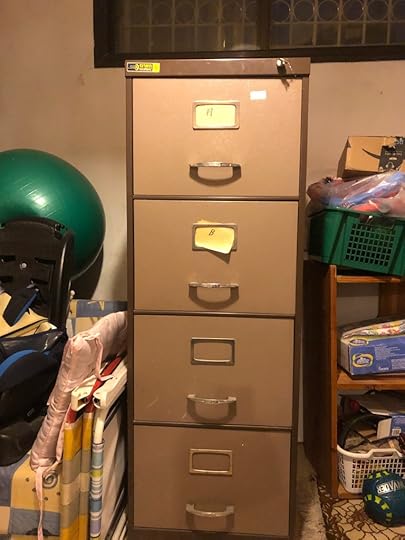
When one of my two sisters asked me to try and find a document about our father, who died twenty years ago, I remembered the filing cabinet. Twenty years ago it took my sisters and me many months to sort through his possessions and dispose of them. His metal filing cabinet, containing dozens of files and papers of various kinds, ended up in the basement of my house, and has remained there virtually untouched ever since.
Our father was reluctant to part with any document or letter that ever reached him, and there were many of those. As I went through the heavy metal drawers the world of my parents re-emerged beneath my fingers. There was a big brown envelope containing the many lovely birthday cards and wishes my father had received for his sixtieth birthday (he lived to be eighty-seven). There were bank statements from England, where he spent most of his adult life, as well as from Israel, where he retired when he turned sixty-five.
There were folders of documents and correspondence relating to the various stages in his life, first in Germany, where he was born in 1916 and whence he fled in 1938, then in England (1939 to 1984) and finally in Israel. Three countries, three languages, and more information than I could possibly cope with on my own.
It was then that I came across the folder of correspondence and documents he had assiduously assembled concerning my own wedding, fifty-five years ago. Suddenly, it all came back to me. I had been living in Israel for a couple of years. My parents were still in England. All our communication was by means of letters. My future husband and I met and decided to get married rather more quickly than was customary in England at that time. However, my parents bravely congratulated us and took their prospective son-in-law to their bosom.
Because my family had relatives in Israel with whom I was in frequent contact, I took my fiancé (though we had no official engagement) to meet them and informed them of our forthcoming marriage. Almost to a man (and woman), they expressed delight, welcomed my prospective husband and speedily brought out something with which to drink ‘lechayim’ to celebrate the occasion. I reported all this joyfully in my weekly letter home.
But it seems that all was not peace and harmony in the wider family at hearing my news. The letters I sent my parents at the time tell the story. “On Shabbat afternoon we went to tell the (relatives who shall remain nameless — D.S.). To my surprise, when I told them that we were getting married they were struck dumb, with nothing but sheer horror written on their faces. They could not even pretend to be pleased or raise a smile between them.”
I wish you could have heard me laughing when I read these words down in the basement the other day. I had completely forgotten about all the family drama at the time of the wedding. With hindsight, I think they expected some kind of long courtship or even vetting process, of which they felt deprived.
It’s all water under the bridge now. Our relations with our relations were eventually mended, and the river of life continued to flow and take us all wherever we were destined to go. But I’m glad I managed to take a trip down the time tunnel and see how young, innocent and vulnerable I once was.
December 30, 2021
East West Street; on the Origins of ‘Genocide’ and ‘Crimes Against Humanity’
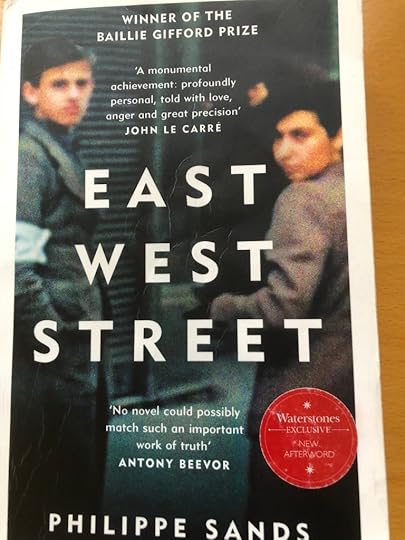
Over the course of six years the author, Philippe Sands, toiled to trace the movements, ideas and political currents underlying two seminal terms in modern international law: ‘genocide’ and ‘crimes against humanity.’ In this undertaking he has interwoven the history and fate of his own family in Galicia (Poland and Ukraine), as well as that of a number of incidental characters, who were involved directly or indirectly in the rescue of some of hia family members and the failure to save others.
The book opens with a description of the scene at the 1946 Nuremberg trial of leading Nazis held accountable for the exile, deportation, dispossession, enslavement and murder of part of the Polish population as well as the four million Jews who lived in Poland. Sands focuses on one of the accused, Hans Frank, Hitler’s personal lawyer and the ruler of Poland under Nazi control, who was held responsible for the atrocities committed in the territory at that time.
The team of lawyers comprising the British prosecution team included Hersch Lauterpacht, distinguished professor of international law at Cambridge university, and the originator of the term ‘crimes against humanity,’ which has since become accepted into international law. As fate would have it, Lauterpacht came originally from that same part of Poland-Ukraine known as Galicia, and had managed to escape the fate that would inevitably have been his since he was a Jew by having carved out an academic legal career for himself.
Another person on whom Sands shines a light is Rafael Lemkin, another Jew and academic lawyer, also originally from the same part of Poland-Ukraine. He managed to flee to America in 1939. His contribution to international law lay in his formulation and definition of the term ‘genocide,’ in the sense of the intent to annihilate an entire national entity or ethnic group. The difference between the two terms is slight, albeit seminal with regard to their respective focus on the individual or the group.
Philippe Sands’ own family also originated from the same part of the world, so that the town of Lviv, Lwow or Lemberg, as it is called at different times and under different regimes, serves as the physical fulcrum around which the events and individuals mentioned in the book revolve. The city was the administrative, academic and cultural centre of the region, serving to attract diverse elements of the population from all over the region, which included many of the villages and small towns where Jews had settled.
Layer by layer (and lawyer by lawyer) Sands constructs the edifice that brings together the annals and fates of the various members of his family over several generations and those of Lauterpacht and Lemkin, the academic lawyers whose formulations have left their mark on international law. The tracks left by the various individuals seem to converge on a certain street in Lvov – East West Street – where almost all the individuals mentioned lived or worked at one point or another. Without knowing of one another’s existence, each one of them may well have passed one another or been familiar with common sights and sounds.
The author has undertaken extensive research to locate and identify a large number of individuals associated in one way or another with the history and fate of his family members, as well as those of Lauterpacht and Lemkin. He has created a fascinating and intricate tapestry revealing the associations between actions, connections and coincidences, leaving the reader with an awareness of the significance of the story behind every human life, whether it be one of academic distinction, human decency or simple survival. And dominating it all, without this ever being expressly stated, is the strand that constitutes the fate of the Jews of Europe in the twentieth century.
December 24, 2021
Israel’s Energy Muddle

In 2000 a natural gas field was discovered in Israel’s offshore waters near Ashkelon, and amid great rejoicing commercial production started in 2004. An offshore rig can be seen from the coast, which doesn’t do much to improve the beauty of the scenery but certainly helps Israel’s energy-starved economy. Till then Israel relied on imported coal and oil to fuel its power stations, as well as on its only natural resource – ample sunshine – to heat water by means of solar panels on the roofs of houses.
The subject of energy is intrinsically interesting to me, but especially so because one of my grandsons has spent the last four years studying for a degree as an energy engineer. Consequently, as I read the daily paper each morning I pay special attention to articles concerning energy, and make a point of sending them to him.
So I was stunned to come across an article in the middle of December stating that the Energy Minister, Karin Elharar, had brought the energy economy to a halt, announcing that there would be no more gas energy explorations for at least a year, and that attention would be focused on the quest for ‘green and renewable energy.’ In so doing she cast aside the government’s energy policy and the recommendations of the governmental committee on the subject.
It seems that I was not the only one who was stunned, because the very next day I came across the headline stating that the government had no intention of infringing its contract to the Trans-Israel Pipeline, the company controlling the pipeline transporting gas from Ashkelon to Eilat, and which was originally built to transport imported oil from the Gulf of Aqaba into Israel. In recent years there has been a growing groundswell of ‘green’ organisations seeking to restrict the use of sources of energy that are considered harmful to the environment.
One can only imagine the furore that must have taken place within the government for the Prime Minister, Naftali Bennet, to immediately issue an announcement stating that no contract with the Trans-Israel Pipeline would be broken, even going so far as to require the Supreme Court to refrain from adjudicating in favour of any such demand.
Israel’s current government consists of a large number of parties, forming a coalition cobbled together in a desperate attempt to prevent the previous government from regaining power, after three general elections which left no party in a position where it could form a government. Inevitably, there are differences of opinion and approach in a government that is so diverse, but somehow, to all appearances, at least till now, the government has managed to function reasonably well without erupting or disintegrating in disagreement. Though who knows what goes on behind closed doors?
So for the moment matters remain as they were before Elharar’s shock announcement, though there are indications that efforts will be made by her and other interested parties to stymie or at least hamper the original agreement. It remains to be seen who will end up with the upper hand. As the old saying goes, we are cursed by having to live in interesting times.
December 15, 2021
Saving the Music Programme

When I first arrived in Israel, in the early 1960s, there was no TV and only one radio programme. In England the radio had played an important part in my and my family’s life, and one of my first thoughts when I had some time to myself was to listen to the radio for information and solace. My knowledge of Hebrew was minimal at best, but I enjoyed the Israeli songs and the occasional broadcasts in English for the immigrant population. One Shabbat morning my ear caught what I inferred was some kind of music quiz, and so one of the first words I learned in Hebrew was the word for composer (malkhin), and I gradually began to try to answer those questions I could understand (answers had to be sent in on a postcard). After several attempts I must have got it right, because a little while later an L.P. (long-playing) record arrived in the post.
With the passing years the Israel radio became more diversified, catering to different audiences. Live performances of concerts by various Israeli orchestras were also broadcast. Whereas in the past the time allotted to classical music was limited to an hour or two a day, this gradually expanded, and one fine day Israel’s music-loving audience was treated to a programme dedicated solely to classical music. At first the broadcasts ended at ten o’clock at night, but at a later stage this was extended to throughout the night (and eventually this segment was taken over by a computerized compilation of recordings).
Those were the days! The producers and announcers became household names, almost friends, whose tastes and interests coincided with my own, and also, presumably, with those of that segment of Israel’s population that enjoyed listening to classical music. We took it for granted that those knowledgeable people knew which performances were best suited for our daily consumption, and we found ourselves in the fortunate position of being surrounded by music at all times. I know that it is considered boorish to have music as a background to other activities, but in my particular case it was a godsend, enabling me to undertake my daily tasks at home and at the typewriter (and later computer) in a golden haze of glorious notes.
But then someone somewhere decided that change was needed. The much-loved Israel Broadcasting Association was disbanded (some say this was politically-motivated),, many of the familiar names and individuals vanished and a general shake-up of the tried and tested programming was introduced. Many new programmes were introduced, but it was a relief to find that the classical music programme could continue, albeit with set hours devoted to jazz and oriental music. Now the body in charge was called Kan.
Suddenly a few months ago a more radical change emerged. Instead of playing a whole symphony or concerto, only one movement or part of a concerto was broadcast. I know that this has been endemic in foreign radio programmes, but this was never done in Israel. The music-loving public reacted with rage and disbelief, and the readers’ letters section of the leading daily newspaper, Haaretz, was flooded with letters protesting the new policy, deriding it as ‘infantile,’ ‘an insult to one’s intelligence,’ and ‘a general dumbing-down’ of the programme which had become an institution for the listening public. In addition, new announcers were brought in, and these did not appear to be particularly knowledgeable about music, having difficulty pronouncing names and often displaying gross ignorance about the music being broadcast (and having a general tendency to talk about irrelevant subjects, such as the weather and traffic).
The authorities were not slow to react. Articles appeared in the paper denigrating the ‘elitism,’ obstinacy and ‘exclusivism’ of the irate listeners. It was even claimed that the listeners belonged to an older generation that was on its way out. But still the letters of protest continued to be published on an almost daily basis, indicating that someone on the editorial board of Haaretz was in agreement with the readers.
Some people, myself included, claimed that the idea behind the change was to attract new, possibly young, listeners, and so it was inevitable that the intellectual level of the programmes had to be toned down. I doubt that the desired result was achieved, and as yet no listener figures have been published. Meanwhile, it looks as if some kind of compromise has been reached, because from time to time we are treated to an actual whole performance of a symphony or concerto. Thank you very much, Kan.
December 8, 2021
The Pomegranate Pendant; A Historical Novel
by Dvora Waysman
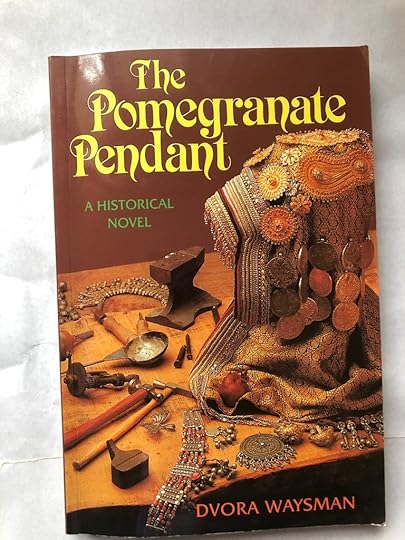
The pomegranate pendant of the title was fashioned in gold as a wedding gift for Mazal, a fourteen-year-old Yemenite girl who is the narrator of the book. The events she recounts begin in the capital of Yemen, Sana’a, in the modest home where she lives with her parents and siblings. Her father, a skilled artisan who fashions the intricate filigree jewellery that is produced by many of Yemen’s Jews, informs his daughter that his apprentice, Ezra, has asked for her hand in marriage, and that he, her father, had given his approval. The pendant was made by Ezra, as a gift for his bride.
Mazal is prepared to follow the custom of the Jews of Yemen and marry while still a teenager, and also to do as her father has decreed, and go to Jerusalem with her young husband and a group of Yemenite Jews in order ‘to prepare to welcome the Messiah.’
The events of the journey across difficult terrain, on foot and on muleback over land and sea, are described in terrifying detail, and the reader is almost able to experience for herself what it must have been like to endure the arduous conditions of travel between the lands of the Middle East in the late nineteenth century. The book recounts the difficult living conditions in Jerusalem, in the country then known as Palestine, which was part of the Ottoman Empire. The group of Yemenite immigrants was initially viewed with suspicion by the Ashkenazi Jews who lived in Jerusalem at the time, but were eventually able to establish their homes there, within the walls of the Old City.
The author has undertaken a great deal of research, and thus the reader learns about the customs and way of life of both the Yemenite and the Ashkenazi Jews of Jerusalem at the time, the history of the various groupd of residents, and the various historical events which determined their fate.
The First World War results in the demise of Turkish rule and its replacement by the British Mandate, as a result of which the city of Jerusalem grew and developed. Immigration by Jews from other parts of the world increased, and the Land of Israel flourished despite the material and political hardships and the opposition of the Moslem population.
While I enjoyed learning about the way the Jews of Yemen lived and flourished in Jerusalem and its environs, I found the general tone of the book somewhat didactic, as is inevitable, I suppose, in a book which seeks to provide information about events which actually happened. I recommend the book as a rich source of information about a part of Jewish history which has tended to be overlooked in the annals of Zionism and the return of Jews from all over the world to their ancient homeland.

